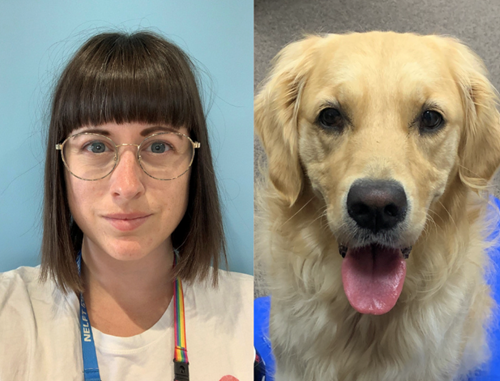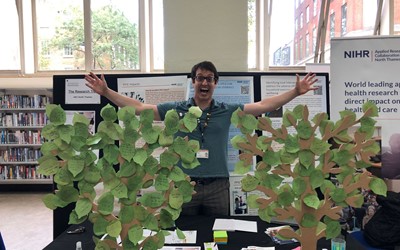Animals are loving creatures that offer comfort and reassurance, decreasing feelings of loneliness and contributing to increased feelings of happiness and enjoyment. For the pet-lovers among us, it might seem obvious that a dog can be a calming, “therapeutic” influence – but more recently, research has shown that therapy dogs can support children and adolescents’ mental health therapies (CAMHS).
 In this blog, Cara Johnston talks about her NIHR ARC North Thames Mental Health Research for All (MH-ALL) Career Development Fellowship, where she has sought to explore this topic on a wider scale.
In this blog, Cara Johnston talks about her NIHR ARC North Thames Mental Health Research for All (MH-ALL) Career Development Fellowship, where she has sought to explore this topic on a wider scale.
Throughout my career as a qualified mental health nurse, I have always worked with children and adolescents. I am currently working in the Mental Health Support Team (MHST) for North East London NHS Foundation Trust (NELFT). My day-to-day work is with schools, to support their young people, parents, and staff to engage with emotional well-being of school pupils (1:1s, workshops and assemblies on well-being, managing anxiety in the classroom, and exam stress), as well as the well-being of staff.
I have always been a bit of a problem solver, with a wider interest in research and improving the service for young people. A few years ago, I went to a research event and learned that there was no research in the UK around how dogs can support children and adolescents’ mental health and therapies. I thought this was strange, as I had assumed most people knew how great dogs (and animals in general) can be for our emotional well-being. This led me to undertake my first piece of research; I recruited a lovely lady and her dog from Pets As Therapy (PAT) and we ran four anxiety management groups for young people ages 11-14. Two groups had the dog with them in the workshop, and two did not. At the start and end of each session, we asked the young people to complete Routine Outcome Measures and a self-rating anxiety scale, and then we compared the results. The results showed that, with the dog present, there was a reduction in anxiety, and an increase in engagement and discharge rates. We were lucky to get our results published here!

Cara and her therapy dog, Peaches
My journey to MH-ALL
Doing this service evaluation sparked my interest in further research and how we can explore this topic on a larger scale. This led me to apply for the MH-ALL Career Development Fellowship.
My experience on the MH-ALL scheme has been supportive, fun and an amazing learning experience. It has given me so many opportunities to be part of various research events, from attending and networking to being actively involved by doing presentations. I have also met some amazing people, which has allowed my research idea to be heard and to grow in a way that will benefit the NHS. The most important thing about MH-ALL is that it has allowed me to engage in research through protected time. I’ve used this to learn and read about research, as well as support other projects ongoing.
Comparing my research knowledge at the beginning of my MH-ALL journey to now, I would say that I have a better understanding of research and the different avenues and roles you can take in this journey. It has also given me the confidence to discuss research in my NHS Trust. From this, I’ve been asked to be the research link nurse for the Trust, where I will bridge the research-practice gap and support and encourage other nurses to get into research. This will involve holding online forums for nurses in the Trust, where we will discuss various topics around research and how they can be involved and/or take their first steps in research. I am being supported by our Research and Development team; we are waiting for results from a survey to see how important this is to nurses in the Trust, after which we will invite those interested to regular forums to discuss research and hear from guest speakers. We plan to have the first forum very soon.
What’s next in my research journey
My next step is to host an event where we will be exploring dog-assisted therapy in children’s mental health with other professionals and users of services. We will think about how important it is for dogs to be available for young people, where the research needs to focus on and how we can implement and have animal assisted therapy as a recognised intervention in the UK as it is in other parts of the world.
After completing the MH-ALL fellowship, I hope to be accepted for a Pre-Clinical Academic Fellowship (PCAF) and after that to complete a PhD in my chosen research topic on assistance dogs in children’s mental health services (CAMHS). MH-ALL has given me the opportunity to meet and start discussions around working collaboratively with other organisations and professionals interested in this. I have thoroughly enjoyed my time with MH-ALL career development fellowship so far and feel empowered to take my next steps!

 20 Nov 2023
20 Nov 2023

